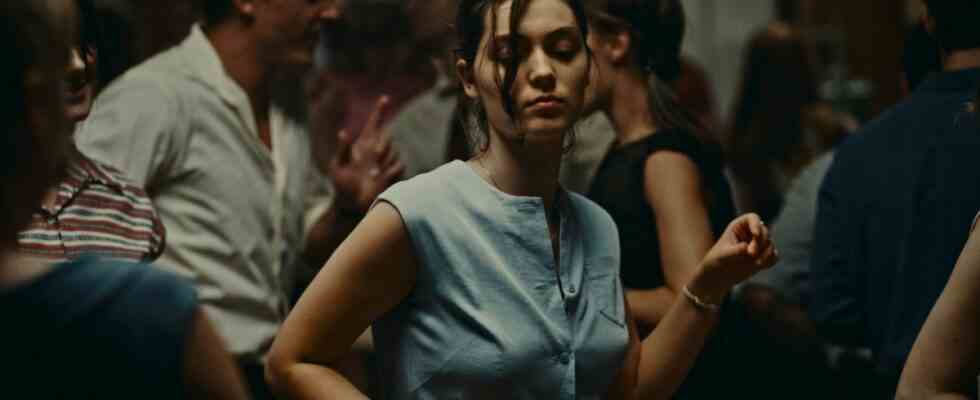At the beginning you see female students preparing for a party. The camera gets close to them, watching them get ready – just don’t look “like bitches”! Then she attaches herself to Anne (Anamaria Vartolomei) and accompanies her to the party. Eyes meet her when she drinks a coke with her fellow student Jean at the bar. One rumor too many and the reputation is gone. The young women dance among themselves, attempts to flirt are fended off.
What seems like coquetry is a survival strategy in France in the 1960s. Abortions will be illegal by 1971. If you want to finish your studies, you must not become pregnant. Anne’s classmates carry their virginity in front of them almost like an award. The boys see that as a challenge, nothing is at stake for them.
The camera stays with Anne from now on, looks over her shoulder, sits next to her as she writes in her diary how long she hasn’t had her period and when the doctor tells her that she is pregnant. Pregnancy is “The Event” in the autobiographical novel by Annie Ernauxwhich the French director Audrey Diwan has now adapted for the cinema. Last year she received the Golden Lion at the Venice Film Festival.
Anne’s decision not to keep the child came early. She is the first in her family to go to college. She cannot and does not want to undo that, but she is alone with her decision. She only gets condescending silence from the doctors and her closest friends.
Diwan’s second film seems uncomfortably familiar, even though it’s set in 1963. Anne is faced with a choice that should seem antiquated today, but is still relevant in many countries, or even relevant again. If she keeps the child, she is doomed to be a housewife and her dream of becoming a writer is shattered.
The term “abortion” never comes up
If she allows it, she risks imprisonment or her life if the clandestine procedure goes wrong. Objectively, Diwan explains what is hidden behind the hackneyed phrase about the right to self-determination. If the power over one’s own body is up for grabs, all other options and goals are also shaky.
“The Event” is not a film of many words. The term “abortion” is not mentioned once, the taboo that Anne has to face is so overwhelming. Unwanted pregnancies are a woman’s business, so she assures the man she was with that she’ll take care of it.
She tells her angry literature professor that she has had an illness that only women can get and that makes them housewives. However, her determination to become a writer has solidified. The story – her story – rushes out of her, needs to be written in order for her to regain sovereignty over her life.
Soberly and therefore so realistically, Anne describes the reason for her poor performance at the university. Exactly this cut, which the linguistically and socially skilfully circumvented event means for her, Diwan not only makes visible with her film, but also makes it physically tangible. Afterwards nothing is as it was.
The initially multifaceted sound level of people chatter, music and clinking glasses disappears more and more from Anne’s perception. Individual noises mix with the ever faster breathing of her panic, which superimposes the first physical signs of pregnancy and narrows her perception more and more. Her body becomes a ticking time bomb for her if she doesn’t find someone to help her quickly.
The images of the physical injuries are sober and drastic
But no matter how close Diwan gets to Anne with the camera, penetrating her diffusely exploding emotional world, there is always an uncomfortable distance, almost as if Anne didn’t really trust the camera either. But how could it be otherwise when even her friends are turning their backs on her because they are afraid of the legal consequences? And her boyfriend Jean takes advantage of the situation to harass her: “Come on, you’re already pregnant, nothing can happen.” In the end, she can’t even bring herself to confide in her mother, who is already proudly telling everyone that her daughter will soon be graduating with honors.
Anne is at the mercy of loneliness in an emotional and forced moral overstrain, and the camera can ultimately only watch helplessly. The images of the physical injuries that Anne first inflicts on herself with knitting needles – and later on a woman with an illegal abortion practice who is trying to induce a miscarriage – are sober and therefore drastic. In these scenes, the camera stares motionless and therefore without a cut at what is happening.
You can feel the horror of these images deep in the pit of your stomach, they leave you feeling tense. But one feels even more intensely the total exclusion that forces Anne to make her own decisions that are actually hardly decidable. The tenacious uncertainty about whether she will survive the procedure and take control of her life again in her own hands is transmitted physically at least as much as the visible injuries.
L’événement, France – Director: Audrey Diwan. Screenplay: Audrey Diwan, Marcia Romano. Camera: Laurent Tangy. Starring: Anamaria Vartolomei, Kacey Mottet Klein, Luana Bajrami. Pro cinema, 100 minutes. Theatrical release: March 31, 2022.

